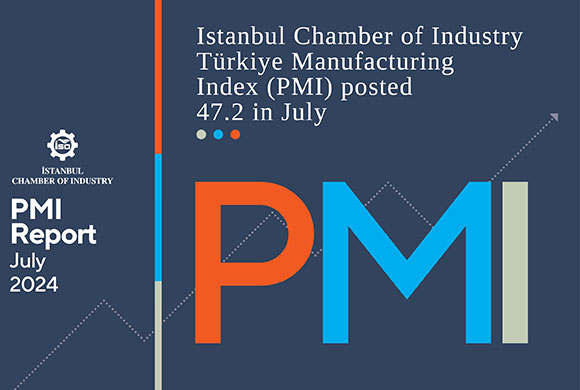News
ICI Released July 2024 ICI Türkiye Manufacturing PMI and Türkiye Sector PMI Report
- 01.08.2024
- News

The headline PMI reading decreased for the fifth consecutive month in July, posting 47.2 from 47.9 in June, signalling a solid slowdown in business conditions in the sector. In fact, new business moderated to the joint-largest extent in 20 months, equal with that seen in November 2023. Employment levels also eased in line with softer new orders, The moderation of workforce numbers was the most marked in 21 months. Shortages of workers also reportedly impacted negatively on production volumes.
According to the Istanbul Chamber of Industry Türkiye Sector PMI report, new orders moderated in all 10 monitored sectors. Output contracted in all sectors except clothing and leather goods. As a result, employment levels and purchasing activities also declined in general. Weak demand conditions led manufacturers to scale back their purchases. Input costs increased in July in most sectors at a faster pace from June.
Istanbul Chamber of Industry (ICI) released the July 2024 results of Türkiye Manufacturing PMI (Purchasing Managers’ Index) survey, which is recognized as the fastest and reliable indicator of the manufacturing industry’s performance in the economic growth. Any figure greater than 50.0 indicates overall improvement of the sector. The headline PMI reading decreased for the fifth consecutive month in July, posting 47.2 from 47.9 in June. As such, the index signalled a solid slowdown in business conditions in the sector, and one that was the most pronounced since last November.
SHARPEST MODERATION SINCE NOVEMBER 2023
Central to the latest moderation in the health of the sector was a marked softening of new orders amid challenging market conditions. In fact, new business moderated to the joint-largest extent in 20 months, equal with that seen in November 2023. New export orders also slowed to a greater degree at the start of the third quarter. Weak demand conditions led manufacturers to scale back production for the fourth month running, and at the fastest pace since November 2022. Shortages of workers also reportedly impacted negatively on production volumes.
EMPLOYMENT LEVELS EASED
Employment levels also eased in line with softer new orders, but the slowdown was also reflective of staff resignations and retirements. The moderation of workforce numbers was the most marked in 21 months. Input costs were up sharply in July, reflecting higher prices for raw materials and oil, as well as weakness of the lira against the US dollar. The rate of inflation quickened from June, as was the case with selling prices. That said, the rise in charges was still relatively muted. Meanwhile, suppliers' delivery times lengthened again amid difficulties sourcing raw materials and high transportation costs. Purchasing activity was scaled back markedly, and to the largest degree since November 2022. Meanwhile, stocks of both purchases and finished goods also moderated.
Commenting on the Istanbul Chamber of Industry Türkiye Manufacturing PMI survey data, Andrew Harker, Economics Director at S&P Global Market Intelligence, said: "There was little sign of any respite for Turkish manufacturers in July as demand conditions remained challenging. If anything, the start of the second half of the year saw an intensification of pressures, with demand, production and employment all moderating to greater degrees than in June. Firms will be hoping for a turnaround in conditions soon.”
NEW ORDERS MODERATED IN ALL TEN SECTORS
Türkiye's Sectoral PMI report indicated that the manufacturing sector faced widespread demand weakness entering the third quarter. New orders moderated for the first time in nine months in all ten sectors monitored. Output contracted in all sectors except clothing and leather goods. As a result, employment levels and purchasing activities also declined in general. On the other hand, inflation rates, after easing in June, signaled an increase in July.
THE SHARPEST DECLINE IN ELECTRICAL AND ELECTRONIC PRODUCTS
New orders slowed down in general, with the sharpest one in electrical and electronic products, which recorded the sharpest decline in nearly two years. The slightest deceleration in new orders was observed in food products sector. Turkish manufacturers performed relatively better in their efforts to win new orders from abroad. Three sectors recorded growth in new export orders, primarily the machinery and metal products sector, while the sharpest declines were recorded in clothing and leather goods and food products sectors.
With the slowdown in total new orders, firms generally reduced their output in July. Only clothing and leather products sector saw an increase in output, while the most significant contraction was observed in the electrical and electronic products sector. Similarly, only one of the ten sectors (food products) increased its employment in July, while the fastest decline in the workforce numbers was recorded in the clothing and leather products sector.
MANUFACTURERS REDUCE PURCHASES
Manufacturers also reduced their input purchases amid weak demand conditions. Purchasing activity was scaled back in all sectors, with the sharpest one seen in non-metallic mineral products.
Input costs increased in July in most sectors at a faster pace from June. The highest rate of input price inflation was recorded in land and sea vehicles, while the lowest rate of inflation was recorded in basic materials. However, even in this sector, input costs increased significantly. After three sectors decreased their selling prices in June, all sectors recorded increases in July. In line with the input costs, the highest inflation in finished goods prices was recorded in the land and sea vehicles sector. The lowest increases in selling prices were recorded in food products and textile sectors.
*You can find attached the Istanbul Chamber of Industry Türkiye Manufacturing PMI and Sector PMI July 2024 reports.